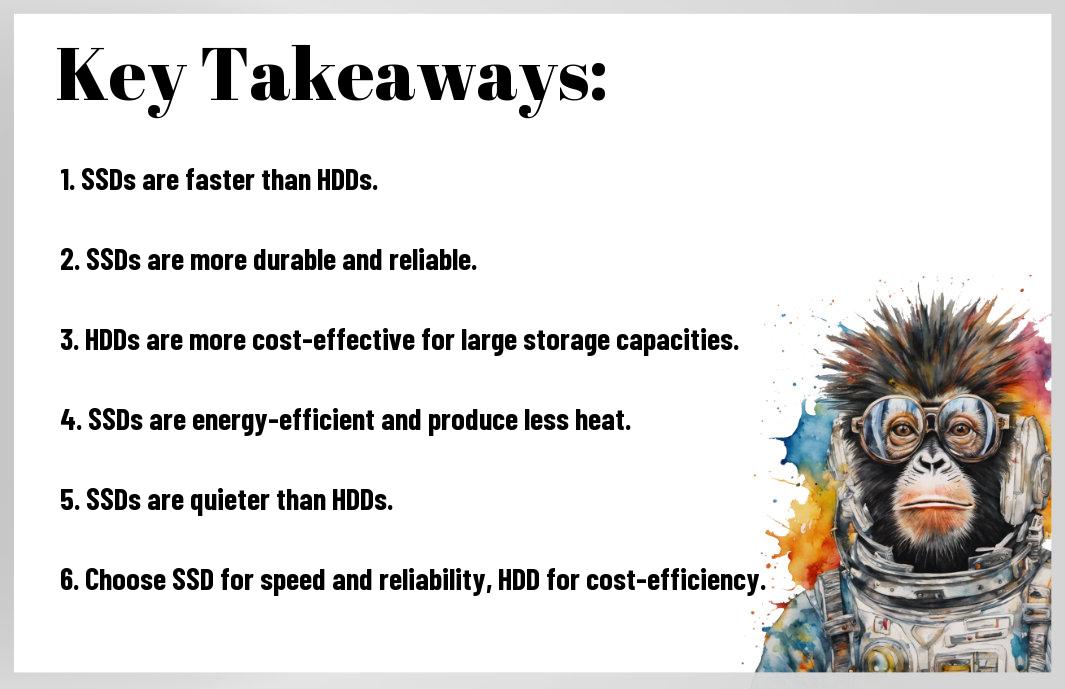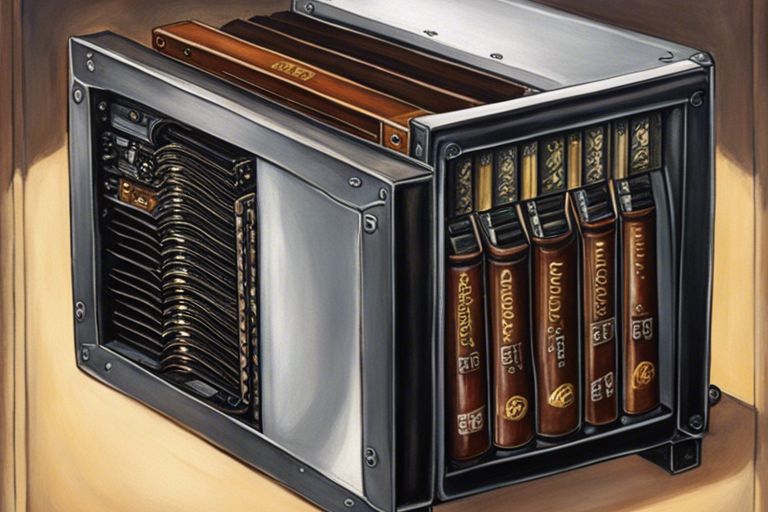Just like making decisions in life and business, choosing between SSD and HDD for your storage needs requires careful consideration. SSDs are known for their lightning-fast performance, durability, and reliability, making them ideal for those who prioritize speed and efficiency. On the other hand, HDDs are budget-friendly and offer larger storage capacities, making them suitable for users with vast data storage needs. In this blog post, we’ll dive deep into the differences between SSDs and HDDs to help you make the best decision for your specific requirements. Let’s not waste any time and get right into it!
Key Takeaways:
- SSD is faster: SSDs have faster read/write speeds compared to HDDs, resulting in quicker boot times and faster access to files.
- HDD is more cost-effective: HDDs are generally cheaper per gigabyte compared to SSDs, making them a more budget-friendly storage option.
- SSD is more durable: SSDs have no moving parts, making them less prone to physical damage compared to HDDs, which have spinning disks.
- SSD is quieter: SSDs operate silently since they don’t have moving parts, whereas HDDs can produce noise due to their spinning disks.
- Consider your needs: Choose between SSD and HDD based on your priorities such as speed, cost, durability, and noise level to determine which storage option is best for you.

SSD – The Speed Demon
What Is an SSD and How Does It Work?
On your quest to choose the perfect storage option, you’ve probably come across the term SSD. Solid State Drives, or SSDs, are the latest in storage technology. Unlike traditional Hard Disk Drives (HDDs) that use spinning disks to read and write data, SSDs use flash memory chips that store data persistently. This means they have no moving parts, resulting in faster access times and improved durability.
Benefits of Going Solid State
Diving into SSDs comes with a multitude of benefits. From lightning-fast boot times to rapid data transfer speeds, SSDs can significantly improve the overall performance of your system. Additionally, their compact size and energy efficiency make them an ideal choice for laptops and other portable devices.
Regarding the Benefits of Going Solid State, you can’t ignore the significant reduction in loading times. Whether you’re launching applications or loading games, the impressive speed of SSDs will leave you wondering how you ever lived without them. Say goodbye to those frustrating moments of waiting for your system to catch up and embrace the efficiency of SSDs.
HDD – The Seasoned Veteran
Once again, we find ourselves submerging into the age-old debate of SSD vs. HDD. While SSDs have been stealing the spotlight with their lightning-fast speeds, let’s not forget about the trusty old HDDs that have been around for decades. In this chapter, we’ll take a closer look at HDDs and why they may still be a viable storage option for many users.
Understanding HDDs and Their Mechanics
To understand HDDs, we need to peel back the curtain on their mechanics. HDDs store data on spinning magnetic disks, with read/write heads accessing the data as the disks spin. While they may not match the speed of SSDs, HDDs offer large storage capacities at more affordable prices, making them ideal for users with large storage needs who are willing to sacrifice speed for cost-efficiency.
When to Stick with Traditional Hard Drives
Understanding when to stick with traditional hard drives boils down to the specific needs of the user. There are several scenarios where HDDs shine, such as in network-attached storage (NAS) systems that require high capacities for storing backups and media files. Additionally, users on a tight budget may opt for HDDs to get more storage space for their money.
Comparing the Contenders
Performance | Cost and Capacity
Performance Showdown – SSD vs. HDD
One of the key factors to consider when choosing between SSD and HDD is performance. SSDs, or solid-state drives, are much faster than traditional HDDs, or hard disk drives. SSDs have faster read and write speeds, which means that your computer will boot up faster, load programs quicker, and overall provide a more responsive user experience.
Cost and Capacity – Finding Your Balance
Your budget and storage needs are crucial when deciding between SSD and HDD. While SSDs are more expensive per gigabyte compared to HDDs, they offer superior performance and durability. HDDs, on the other hand, provide larger storage capacities at a lower cost. It’s important to find the balance between cost and capacity that best suits your needs and budget.
Apart from considering the initial cost, also factor in the long-term value of the storage option you choose. Remember that SSDs tend to last longer and are less prone to failure compared to HDDs, ultimately saving you money in the long run. Assess your storage requirements and prioritize performance and reliability for a smoother computing experience.
Making the Decision
Matching Storage Options with Your Needs
Needs are everything when it comes to deciding between SSD and HDD. If you’re a gamer or content creator who needs speed and performance, go for an SSD. On the other hand, if you’re a casual user looking for more affordable storage, an HDD might be the better choice.
Future-Proofing Your Choice
Your choice of storage should not only meet your current needs but also future-proof your system. With technology advancing rapidly, it’s vital to consider where you see yourself in a few years. Investing in an SSD may cost more initially, but its speed and durability will keep your system running smoothly for years to come.
Understanding the importance of future-proofing your storage choice is vital in ensuring you make the right decision for your needs. An SSD may be more expensive, but its performance benefits and reliability make it a worthwhile investment in the long run. Consider your usage habits and where you see yourself in the future before making a decision.
Conclusion
Following this deep investigate SSD vs HDD, it’s clear that the best storage option for you depends on your specific needs and priorities. If speed, durability, and efficiency are at the top of your list, then SSD is the way to go. However, if you require high storage capacity at a lower cost, then HDD might be more suitable for you. Ultimately, the choice between SSD and HDD comes down to what you value most in a storage device. Make an informed decision that aligns with your goals and budget, and you’ll be on your way to maximizing your productivity and performance.
FAQ
Q: What are the main differences between SSD and HDD?
A: SSDs use flash memory to store data, making them faster and more durable than HDDs, which use spinning disks to store data.
Q: Which one is faster, SSD or HDD?
A: SSDs are significantly faster than HDDs because they have no moving parts, allowing for quicker data access and transfer speeds.
Q: Are SSDs more expensive than HDDs?
A: Yes, SSDs are typically more expensive than HDDs due to their advanced technology and faster performance. However, prices have been decreasing in recent years.
Q: Which storage option is more durable, SSD or HDD?
A: SSDs are more durable than HDDs because they have no moving parts, making them less susceptible to physical damage from drops or bumps.
Q: How do I choose between an SSD and an HDD for my storage needs?
A: Consider your budget, performance requirements, and storage capacity needs. If you need speed and durability, go for an SSD. If you need more storage space at a lower cost, an HDD might be a better option.


![Roblox Digital Gift Code for 1,700 Robux [Redeem Worldwide - Includes Exclusive Virtual Item] [Online Game Code]](https://m.media-amazon.com/images/I/51BgFbIoAdL._SY430_SX215_QL70_ML2_.jpg)
![Roblox Digital Gift Code for 2,200 Robux [Redeem Worldwide - Includes Exclusive Virtual Item] [Online Game Code]](https://m.media-amazon.com/images/I/51LrwIVIf7L._SY430_SX215_QL70_ML2_.jpg)